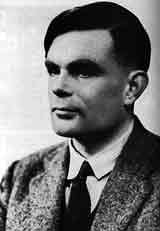 |
| alan-turing (Photo credit: Revolweb) |
Today, British mathematician Alan Turing would have turned 100 years old. It is barely fathomable to think that none of the computing power surrounding us today was around when he was born.
But without Turing's work, computers as we know them today simply would not exist, Robert Kahn, co-inventor of the TCP/IP protocols that run the Internet, said in an interview. Absent Turing, "the computing trajectory would have been entirely different, or at least delayed," he said. (click below to read more)
For while the idea of a programmable computer has been around since at least 1837 -- when English mathematician Charles Babbage formulated the idea of his analytical engine -- Turing was the first to do the difficult work of mapping out the physics of how the digital universe would operate. And he did it using a single (theoretical) strip of infinite tape.
"Turing is so fundamental to so much of computer science that it is hard to do anything with computers that isn't some way influenced by his work," said Eric Brown, who was a member of the IBM team that built the "Jeopardy"-winning Watson supercomputer.
A polymath of the highest order, Turing left a list of achievements stretching far beyond the realm of computer science. During World War II, he was instrumental in cracking German encrypted messages, allowing the British to anticipate Germany's actions and ultimately help win the war. Using his mathematical chops, he also developed ideas in the field of non-linear biological theory, which paved the way for chaos and complexity theories. And to a lesser extent he is known for his sad demise, an apparent suicide after being persecuted by the British government for his homosexuality.
But it may be computer science where his legacy will be the most strongly felt. Last week, the Association of Computing Machinery held a two-day celebration of Turing, with the computer field's biggest luminaries -- Vint Cerf, Ken Thompson, Alan C. Key -- paying tribute to the man and his work.
Turing was not alone in thinking about computers in the early part of the past century. Mathematicians had been thinking about computable functions for some time. Turing drew from colleagues' work at Princeton University during the 1930s. There, Alonzo Church was defining Lambda calculus (which later formed the basis of the Lisp programming language). And Kurt GAPdel worked on the incompleteness theory and recursive function theory. Turing employed the work of both mathematicians to create a conceptual computing machine.



No comments:
Post a Comment